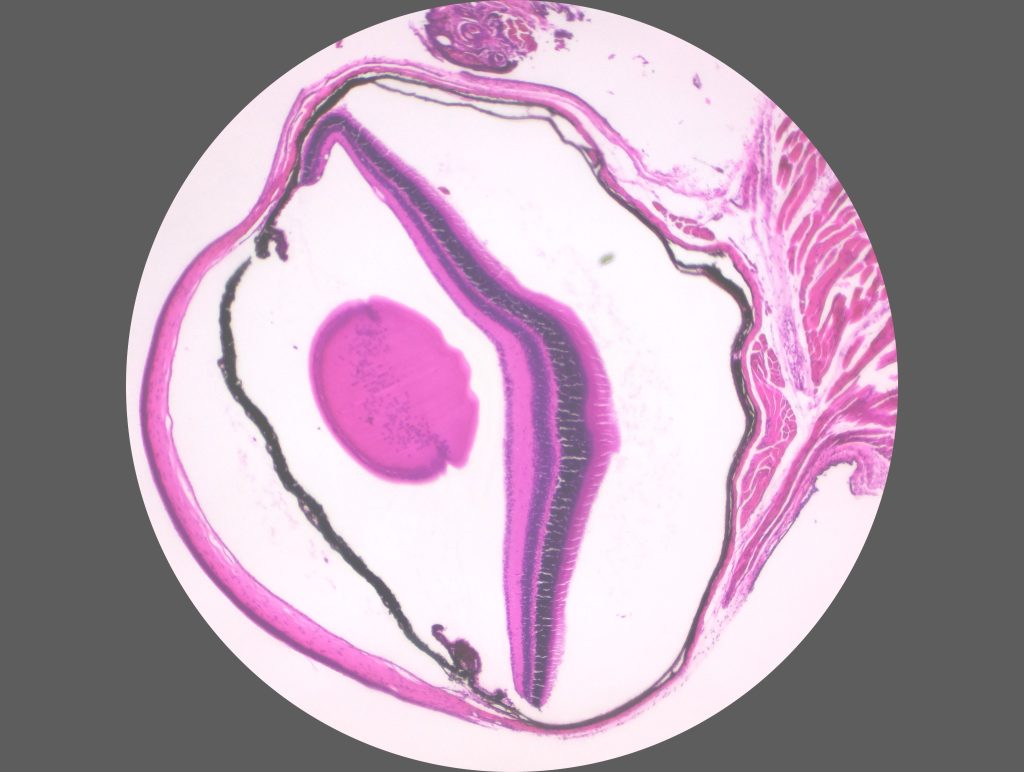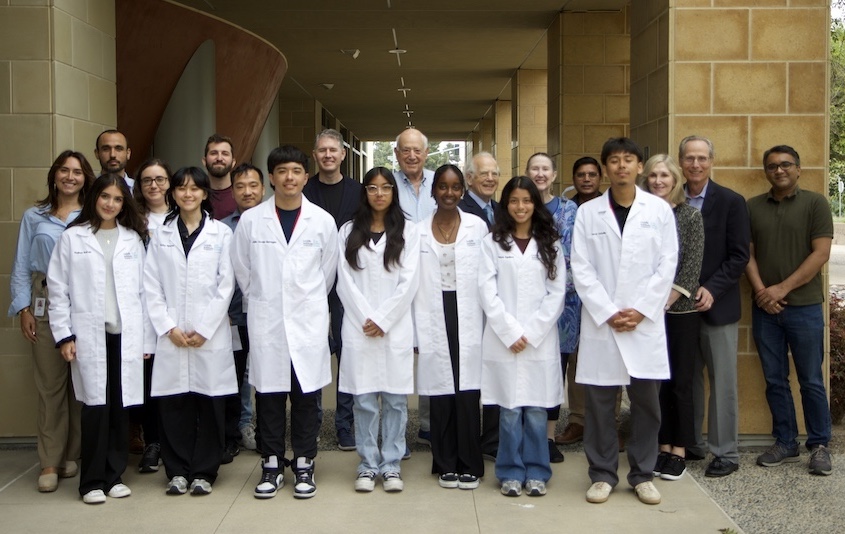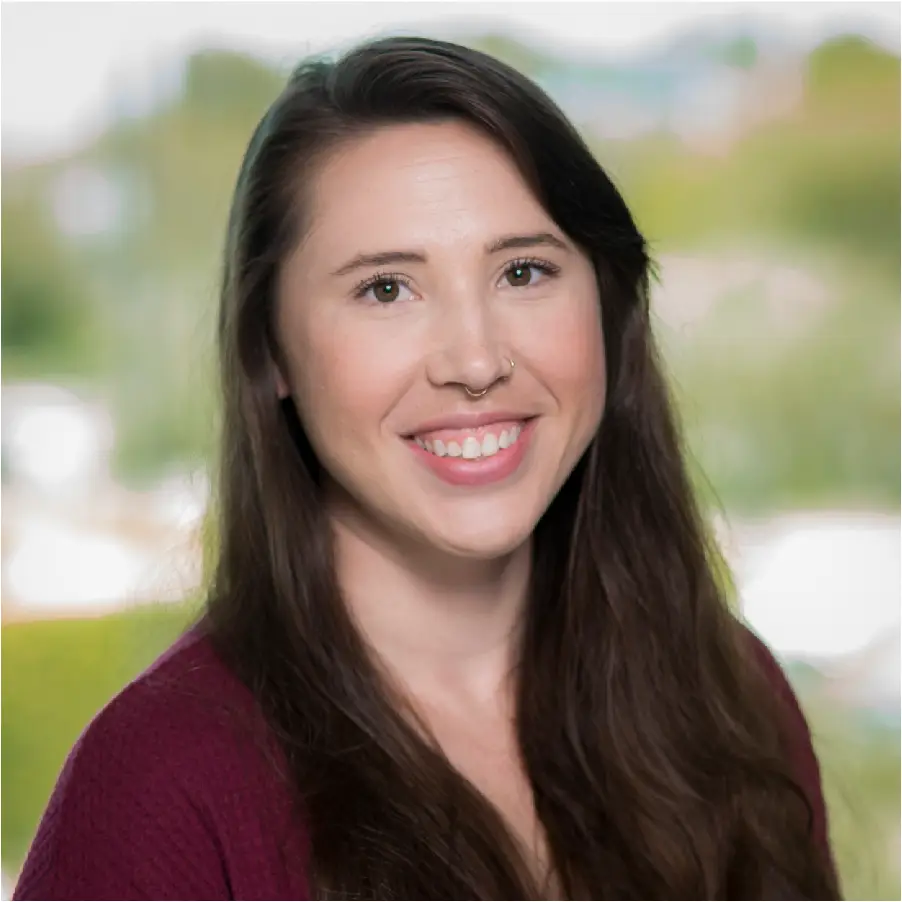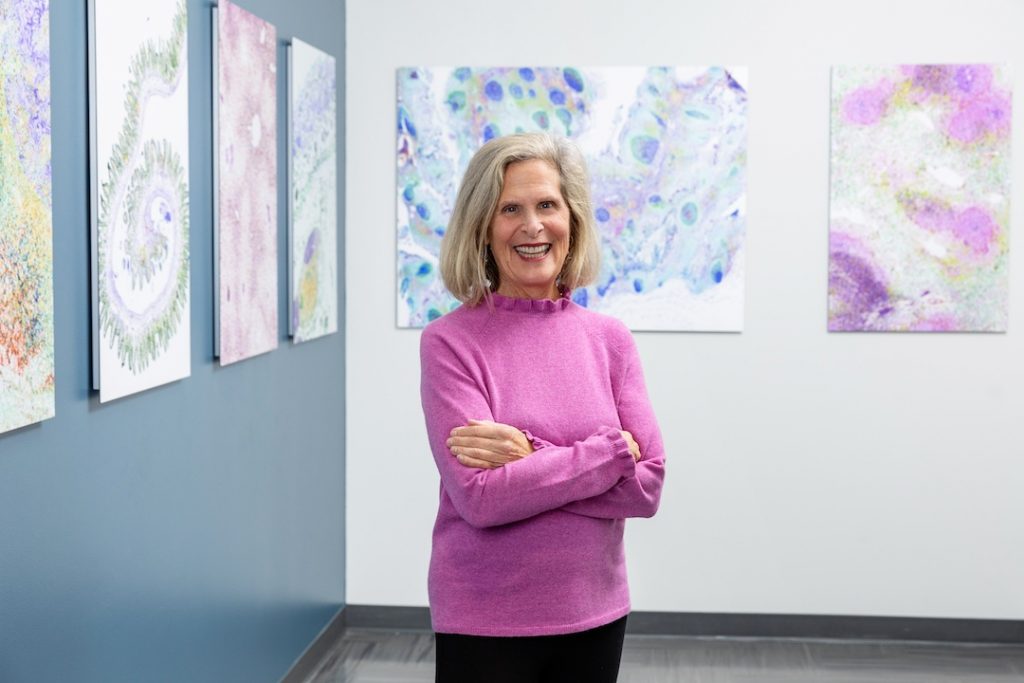If Kathy Nguyen is ever your eye surgeon, you’ll be in good hands.
This brilliant UC San Diego undergraduate student is fascinated by the visual system and how the wiring of the eye connects to the brain. Nguyen plans to make a career in medicine, so she’s doing everything she can to gain hands-on experience.
Nguyen started by applying to work as a clinical research assistant in a lab studying traumatic brain injury at the Veterans Affairs San Diego Hospital. Through her lab work, Nguyen learned more about the complexity of the brain and the visual system. Then Nguyen heard about the Summer Internship Program at La Jolla Institute for Immunology (LJI).
Nguyen says she was nervous about applying to a research internship, but then she had a chance to meet with her mentor, LJI Assistant Professor Miguel Reina-Campos, Ph.D. Reina-Campos uses a range of cutting-edge tools to study how immune cells defend specific parts of the body, including the eyes.
“I expressed my passion for the visual system, and eyes especially, and he allowed me to take that interest into immunology,” says Nguyen.
Nguyen’s internship began with LJI’s White Coat Ceremony, where interns receive lab coats and are encouraged to see themselves as scientists. Within days, she was assisting with experiments and taking her own close-up images of mouse corneas.
Beyond science basics
Each year, LJI’s Summer Internship Program brings a talented group of high school and undergraduate interns to campus. Some interns, including Nguyen, are part of the UC San Diego PATHS Program, which provides critical mentorship and financial support for undergraduate UC San Diego STEM students from underrepresented communities.
LJI interns work closely with mentors to learn hands-on research techniques and practice using cutting-edge tools. Even the high school interns assist with real data collection and analysis.
LJI employees, volunteers, and generous donors work together to help these interns reach their career goals. Each year, this team reviews student feedback and looks for ways to improve the internship experience. As a result, LJI has crafted a program that goes far beyond basic scientific training. LJI provides more than a dozen career development workshops and presentations to cover professional norms and give interns a chance to hone their public speaking and scientific writing skills.
“The summer program involves many individuals at LJI, whether they directly mentored an intern, led a workshop, or offered networking opportunities,” says LJI Mentorship Coordinator Lizzy Dorner. “The spirit of collaboration and mentorship is deeply ingrained in LJI’s culture, and to have the opportunity to involve the next generation of scientists is truly impactful.”
“LJI has a wonderful working environment,” adds LJI Executive Project Manager Christina Kim, an LJI volunteer who helped establish the program. “Interns have said they feel comfortable at LJI, and they appreciate the technology and resources we have here.”
No more barriers

As the summer went on, Nguyen made an exciting breakthrough. She’s always had shaky hands, and she worried her shakiness could interfere with her dream of becoming an eye surgeon.
“I was just not confident in my abilities,” says Nguyen. “But being at LJI, I got to practice cornea dissections and learn from other people how to stabilize my hands. It’s motivated me even more to pursue ophthalmology and forget about that barrier.”
Nguyen has a clear picture now of what it will take to have a career in medicine. Like the majority of LJI’s summer interns, she completed the program feeling eager to gain even more research experience.
Some former interns continue to contribute to research here at LJI. Angel Sarabia is a former PATHS program student who came to LJI as a summer intern two years ago. After a busy summer in the Shresta Lab, Sarabia hoped to find a way to stay at the Institute.
“I enjoyed being surrounded by experts in immunology and getting to learn from them firsthand—and having the ability to do all these cool experiments,” says Sarabia. “That’s why I really wanted to stay at LJI.” Sarabia got his wish and worked in a part-time position as he completed his undergraduate degree at UC San Diego.
Today, Sarabia is a full-time Research Technician in LJI’s Crotty Lab. Sarabia’s day-to-day tasks include setting up experiments and collecting data on how the immune system fights influenza, HIV, and other pathogens. His work is extremely technical, and he’s learned how to use flow cytometry and enzyme-linked lectin assays (ELLAs) to shed light on immune responses.
“The internship period helped me learn how to talk to scientists,” says Sarabia. “I got to build a general understanding of what these different, really fundamental techniques are in immunology, and in science in general.”
Donor support is critical

The LJI Summer Internship Program officially began in the summer of 2022.
Donors Walter and Lola Green have been long-standing supporters of the program, specifically underwriting the UC San Diego PATHS students, including Nguyen and Sarabia. “The internship program at LJI is a prime example of how 1+1+1 equals much more than 3! These are really talented interns, working at a world renowned institution, with mentors and lab mates who really care. That is a very powerful combination,” says Walter Green.
LJI donors Ken and Barbara Magid have been integral in supporting high schoolers in the LJI Summer Internship Program, and they return year after year to witness the students’ growth throughout the summer—from their White Coat Ceremony to final presentations. The Magids’ gifts have allowed the Institute to offer more high school internship positions in recent years.
Ken Magid says it’s important that these summer internships are fully paid so students don’t have to forsake career training to work a summer job. “When I was younger, I had to work during the summer months,” he says. “I wouldn’t have been able to take an internship and not make money.”
Seeing themselves as scientists
It takes a team effort to give LJI trainees a solid grasp of the fundamental skills needed in science—and in the professional world overall.
These efforts are paying off. Dorner regularly checks in with Summer Internship Program alumni. She’s had former interns report back that they’ve pursued careers as nurses, dermatologists, computer scientists, and even stem cell biologists. One former high school intern went on to receive a full-ride scholarship to attend UC San Diego.
“Year after year, we have seen incredible outcomes from the summer program,” says Dorner. “Students consistently report increased understanding of scientific concepts, greater confidence in a professional environment, and increased likelihood of pursuing scientific careers.”
The Magids have seen LJI interns accomplish great things. Going forward, they hope the Institute can work with more high schools to bring in talented future scientists.
“It takes a lot for a high school student to wake up in the morning, put on a white coat, come here all day long, and do this kind of work,” says Barbara Magid. “But I always tell students that you never know what you’re going to do, but you might meet the one person who’s going to change your life.”
“This program enlarges their view of themselves and their lives—and gives them the opportunity to see what they could do in the future,” says Ken Magid.
The LJI Summer Internship Program is made possible by the generosity of Ken and Barbara Magid, Walter and Lola Green, the Liguori Family, and James and Katya Hazel. If you are interested in learning more about how you can support the program, please reach out to LJI Advancement Officer, Jessica Chadwell, at jchadwell@lji.org or 858.752.6678.


